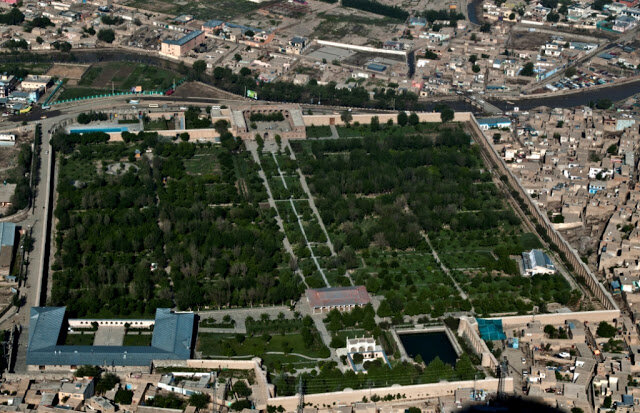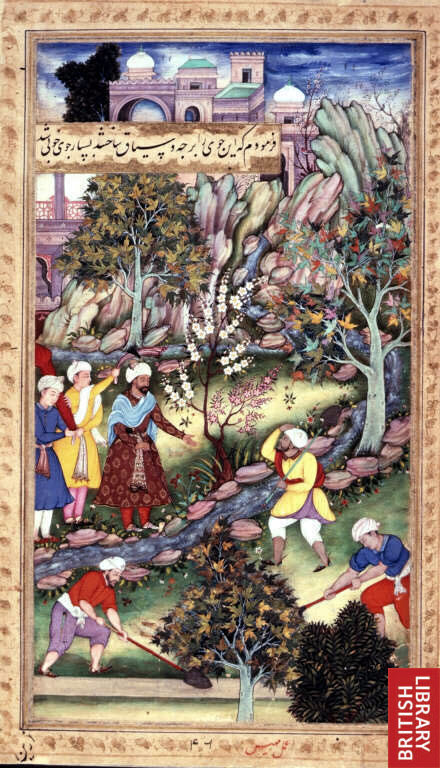Please read part 4 for a summary of where we are up to.
Kabul is a perfect and peaceful place to communicate my findings with the known universe. For me it is as if Kabul is the centre of knowledge. Our university consistently makes great discoveries in many fields. The Kabul climate is extremely hot in summer and very cold in winter. This variation in climate seems to stimulate a vast group of students and professionals to attend Kabul University. Our cities compare in technology with the best cities in the world. Buildings are sustainable and poverty is a thing of the past.

Babur gardens have a long history in Kabul
I have a small but comfortable flat in Kabul city, a short walk from the University. All around me are street food vendors. Long gone are the days when a female was fearful to be alone in a city at night. I feel safe walking through the streets 24 hours a day. In cool summer evenings the streets are vibrant until late at night. Nothing is better for me than meeting my intellectual friends in the cafes for a good debate. Even on my own, I like to watch others doing just the same. Actually on warm evenings people in large and intimate groups sit on the kerbsides and drink coffee and tea. The evenings in summer is a time to relax amongst friends in open space. When we have a little more time we like to wander and relax in the Gardens of Babur. These ancient gardens have interesting horticulture and a mecca for tourists.
The countryside outside the city of Kabul is inspiring to visit and only minutes away. Huge mountains surround the city and they are often snow-capped. On the valley floors sustainable farming practices flourish, and produce the best tasting fruit and vegetables. Water of course is a vital and a well-managed resource for horticultural crops. Our best food comes from farms which have grown produce in the same fashion for thousands of years. Many farms are small and first feed a small population that live within a few kilometres of the fields. This saves both water and transportation energy. Surplus produce is sent to city markets in Kabul. Most farms are a little business that have been held in the same family for generations. The fields are kept in good condition with added manure from the farmers livestock. The farmers are extremely skilled in horticultural practices and know just when to plant their crops and how to irrigate to maximise productivity.
As a child on the farm I watched both hard work and laughter. I watched the men and women toil but use great skill to produce abundant food. On a recent trip to my old home, I was surprised by Abdur and my old classmates. They arrived in a small bus with banners wishing me well Down-Under. After a briefing, we naturally moved to a banquet made of traditional foods lamb, rice, vegetables, yogurt, mint, lemon and garlic, followed by fruits including my favourite the pomegranate. It was such a natural thing for me to mix with my friends, food, and their utmost respect for me and my studies. I thought, how much I may miss this in Australia.
In Kabul CBD we have some great high tech structures amongst our heritage buildings. As with all major cities now, green infrastructure is the go. Low carbon construction and energy efficiency has been achieved. Plus the vegetation on the roofs and walls of many buildings provides beauty to the city. Many buildings have indoor and outdoor fruit and vegetable gardens to supply food to the residents and workers. All types of birds and nature is brought in by the greenery. It somewhat reminds me of my childhood in the forest. This nature experience provides an ideal place for thought provoking research.
Some preliminary research that was distasteful had to be done. I have to look at the chaos that had taken place in the lead up, in the 16th and 17th century. I needed to fully understand it, so that I can spot changes in our behaviour. It was a time of chaos and war.
If you don’t want to hear about horror.... don’t read this next section, skip and wait for Part 5.
People from the 17th century in Europe of whom this story is partially about had witnessed the destructive power of wars first hand and had an acute knowledge of history. Most recently and closest to them were the Napoleonic wars and how they spread from France to Egypt and the Americas. Apart from death and long term physical injuries from war many people suffer acute physiological trauma. They suffer due to what they have witness or been engaged in. Governments find young soldiers easy to manipulate with their propaganda.
Soldiers forgetting their actions often manifests itself into post-traumatic stress syndrome or PTSD. This illness often goes unnoticed as they attempt to live a normal life with a partner and have a family. Many just become hermits unable to face relationships with anyone. Having poor communication skills and a partner that has no idea what you have experienced is a poor recipe for a happy relationship. It can be even worse if the people affected by war are in establish relationships. A soldier’s behaviour is more likely to affect other members of their family. A lack of communication skill often leads to violence aimed at their offspring. When in young experience violence from their parent in the safety of their home they too develop physiological illnesses. The war experience has now spread to two generations. It is said that this can often continue and thus the effects of war continue often lasting 3 generations or 60 years after the actual war ended.
War is a result of greed or poor negotiation by leaders of countries. War is the worst form of theft. Even Aeschylus from ancient Greece taught us about war when he said “In war, truth is the first casualty”.
Apart from war the people of the world in the 1700’s were all too familiar with violent acts sprung upon them by their own rulers. Often ethnic groups were targeted or the poor just to clean up poorly managed communities. There was a lack of compassion by the wealthy for the working classes and a great uneven distribution of wealth. This led in part to great revolutions as happened in France in 1791. Slavery too was prevalent also at this time. Various groups of opposition were trying to wipe out this repressive scourge.
A period called the Enlightenment formed around this period. In this time people could freely speak their mind and expose corruption, something the ruling class up to then did not tolerate. Previously free speech was viewed as treason. I’m sorry to harp on the actions of humans, but it plays an important element of why I believe the world changed with the advent of reason and by those remarkable events that followed in Australia.


